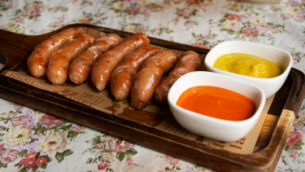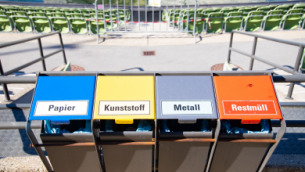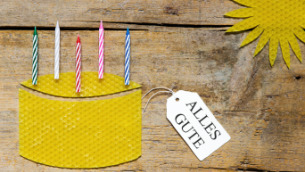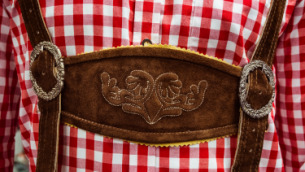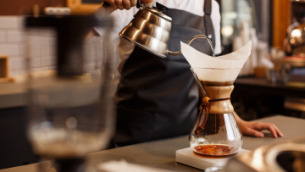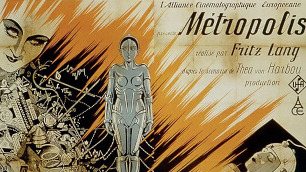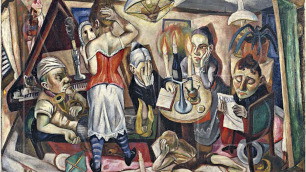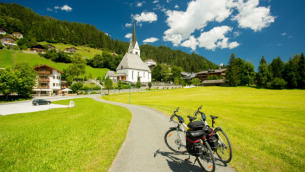| Jana: | Hallo and welcome to our listeners! |
| Michael: | Willkommen an alle! |
| Jana: | Ah wunderbar! You just gave me the perfect introduction. |
| Michael: | I did? |
| Jana: | Yes, the word “willkommen” used to be written as “willekomen”. It is composed of the noun “Wille”, which means want, and an ancient form of kommen, to come. |
| Michael: | Yes, that makes sense! If we are happy about a visitor, we want them to come in. We invite all our listeners to our course! But, um, how does that relate to today’s lesson? |
| Jana: | Well, today we are talking about modal verbs. Modals are a special group of verbs that have something special in common: They allow us to express our wishes. So we tend to use them a lot on a daily basis. |
| Michael: | Oh, I see. And when you just talked about the noun “Wille”, the verb wollen, to want, is related to that. |
| Jana: | Genau… Exactly. As we often say at the start of our weekly news program: Wir wollen mit unserer ersten Nachrichtenstory beginnen! |
| Michael: | Oh, super, and a more colloquial word for beginnen is anfangen: Ich will anfangen bitte! |
| Jana: | Perfekt! Right, so there we can already see that a lot of the modal verbs are irregular and have changing vowels. The first person doesn't say ich wolle, but ich will. |
| Michael: | Wolle? Come on, don't get our listeners confused! Wolle is a noun and it means wool! |
| Jana: | Ja, thank you for clarifying that for us! And you are absolutely right, this is supposed to be easy! It might help to use the English verb “to will” to memorize wollen, as in to “will something to happen.” A reminder that this modal verb expresses a wish. |
| Michael: | That’s still too dry! Ich will Spaß! |
| Jana: | Hey, you want to have fun? OK then, this is the perfect moment to break down that great music clip we heard in the beginning of this episode. It’s one of my favorite songs to listen to while driving: Ich will Spaß! |
| Michael: | Ja! Ich will Spaß, ich will Spaß, ich geb Gas, ich geb Gas! I step on the gas… OK, does that mean we are speeding up even more today? |
| Jana: | Nein, nein! But to spice up today’s lesson a bit, we are using the Autobahn to take a little culinary trip across Germany. |
| Michael: | Oh, what a great idea! I have so many favorite foods. |
| Jana: | Me too, and I bet our listener's mouths will water while learning some new important verbs. Modal verbs each conjugate in their own way, and they are really very useful tools. |
| Michael: | Especially when ordering food! |
| Jana: | Ja. So, even if this may seem challenging at times, you can think of it like… sampling cuisine! |
| Michael: | You are trying out different modal verbs to say what you want. Du sagst, was du willst. |
| Jana: | Oh, sehr gut! |
| Michael: | Hmm, so now the question is: Wo fangen wir an? Where to start? There are so many great dishes, Jana. |
| Jana: | Well, let’s follow a geographical route. Wir fangen im Süden an, we start with the south and then go north. This allows us to include German-speaking countries like Austria and Switzerland. Hmm, speaking of Austria… When I think of Austria, there is something I really would love to eat right now: Ich will Linzertorte, I want Linzertorte! If you’ve never tasted it, it’s a famous almond and raspberry pie from the city of Linz. |
| Michael: | Du willst Linzertorte essen? Ich will Schwarzwälder Kirschtorte essen. I want to eat Black Forest cake, a yummy layered cake with cherries, chocolate, and whipped cream, from the Black Forest, near the Swiss and French border of Germany. |
| Jana: | Well, don’t forget they add Schnaps in there for a very special effect! But you also just used this modal verb wollen differently, by adding another verb: Ich will essen. |
| Michael: | You’re right. And I just noticed that it actually sounds quite demanding. Ich möchte, I would like to, is used more often and conveys a more friendly tone. |
| Jana: | Sehr gut. Möchten is the infinitive, and thankfully, when conjugating, the vowel never changes: Ich möchte Kuchen, du möchtest Kuchen, er möchte Kuchen. |
| Michael: | And when you are at a restaurant, you can say: Ich möchte bitte ein Wiener Schnitzel! Wiener Schnitzel is a breaded veal or chicken cutlet. And it’s my favorite Austrian specialty. |
| Jana: | And you can add a second verb here, too. Viele Leute möchten Schokolade essen. |
| Michael: | Well, looking back at our map, I’d say: Sie möchten Schweizer Schokolade essen! They would like to eat Swiss chocolate! |
| Jana: | Hmm, lecker! So yummy, I can almost taste the Lindt & Spruengli! And here is another verb that sounds similar to möchten: mögen, which means to like. Viele Leute mögen Tee. Many people like tea. |
| Michael: | But here, the vowel changes depending on the subject: Ich mag Brezeln mit Butter. |
| Jana: | Yum! That is, of course, one of our most famous foods, originally from Bavaria. |
| Michael: | OK, but we need to mention some other foods, now that we have arrived in the south of Germany. The South is recognized as the land of sausage. Which one is your favorite? |
| Jana: | Well, I’m a vegetarian, so I guess I’ll go with Sauerkraut!... but why don’t you tell me which one your favorite is? |
| Michael: | Du magst Sauerkraut? Echt? |
| Jana: | Really? Well yes, sometimes. It is actually very healthy! |
| Michael: | OK, ich mag Nürnberger Würstchen. Remember that we talked about the ending -chen, so these are small, but really tasty. But then there are Frankfurter Würstchen, and many different kinds in Bavaria, but probably the most famous Wurst is the Currywurst. |
| Jana: | Mein Sohn mag Weisswurst und Nürnberger Würstchen. |
| Michael: | Your son likes those, too? He has good taste! |
| Jana: | Yes, but speaking of Nürnberg, also located in Bavaria, one of my family’s favorite treats is Lebkuchen. Wir mögen Lebkuchen – we like gingerbread cookies. |
| Michael: | Not so fast! I’m not done with the sausages: In my old town, there is a sausage street seller, who has been at the same spot since the 70s! Die beste Currywurst der Welt! The best currywurst in the world! |
| Jana: | I know there are many claims about where the currywurst was invented, among them Berlin. But it must’ve been one of those small street stands, how fascinating that it has been there that long! Where is that town again? |
| Michael: | Near Cologne. And speaking of the Rhineland area: Himmel und Erde, pronounced Himmel und Ääd, is another dish I need to recommend here. It’s mashed potatoes with applesauce and Blutwurst on the side. |
| Jana: | Oh, I remember… Himmel, the sky, refers to the apples hanging in the tree, and Erde, the Earth, is represented by the potatoes. They used to be called Erdapfel, an apple of the earth. |
| Michael: | Hmmm, ich mag und esse das so gern. |
| Jana: | Oh, good thing you mentioned that. Gern, or gerne, is an adverb, which can also be used to express what you like. This is a set phrase that you might use a lot in this context. |
| Michael: | And there’s no difference between saying gerne and gern. I can say “Magst du Spätzle?”, do you like Spätzle? This is the same as "Isst du gerne Spätzle”? |
| Jana: | Great! This is actually the perfect example to highlight the use of what is called "inversion" in question form. You have already seen us create questions simply by adding a question mark at the end of a statement. But Germans also invert the subject and verb to form a question, just like we do in English. It tends to feel pretty natural to English speakers, and it's not very complicated, so keep an eye out for that. We have an entire lesson dedicated to questions coming up soon. |
| Michael: | OK. |
| Jana: | And Michael, do I like Spätzle? What kind of question is that! Of course, and thanks for including that, another highlight from the south of Germany. Spätzle is the German equivalent of mac and cheese, except the pasta is made from scratch and the cheese sauce is just to die for! |
| Michael: | Speaking of dying, there are also modal verbs that express the opposite of what we want, right? Because I have a food allergy, and can’t eat certain foods. |
| Jana: | Oh, nein! But one could say: Ich kann das nicht essen, I can’t eat that. Here I used the verb können, to be able to do something. And notice that nicht comes right before the second verb. But obviously, we use it often without negating it. For instance, this is for our listeners: Sie können ein bisschen Deutsch. You can speak a bit of German. |
| Michael: | Und wir können die Nachrichten lesen. |
| Jana: | We can read the news! But let’s add another important verb that fits better when you want to say that you shouldn’t eat a certain food: dürfen, to be allowed to. Again, we can use this in a positive context: Das Kind darf morgens Schokolade essen, the child is allowed to eat chocolate in the morning. So, I'm curious, Michael, was darfst du nicht essen? What are you not allowed to eat? |
| Michael: | Nüsse, nuts… Ich darf die nicht essen. I’m not allowed to eat them. |
| Jana: | I feel bad for you! But this highlights another modal verb that we can use to give advice: Sollen means should. Du sollst das nicht essen. You should not eat that. It sounds a bit like you are talking to a child or making a resolution. |
| Michael: | And we can mention here that adding a modifier is very common, too. Wir sollen weniger Kaffee trinken. We should drink less coffee. |
| Jana: | Ah, and coffee makes me think of a breakfast dish that is popular in many areas but comes from the center of Germany and has a funny name: Arme Ritter, which means poor knights. |
| Michael: | Lecker! It’s like French toast, and probably got its name from the idea that in the Middle Ages, stale bread was put to good use by frying it until it’s crispy. I like mine with cinnamon and fruit compote. Even the Grimm brothers liked this dish! |
| Jana: | OK, we’re getting ready to wrap up for today, but we must mention müssen, which means must and we use it quite a lot. Wir müssen unbedingt Marzipan erwähnen. |
| Michael: | Jana, you absolutely have to mention Marzipan? |
| Jana: | Yes, my favorite sweet treat, which was invented in Lübeck, all the way in the north of Germany. Ich muss das heute kaufen. I have to buy that today. |
| Michael: | OK, you sound a little desperate. By the way, though, there is some disagreement whether the origin of Marzipan is Persia or Luebeck! I vouch for Germany of course. Es muss aus Deutschland kommen! |
| Jana: | Yes, it must be from Germany! Did you know that it was invented during a famine? They had only almonds and sugar left, and so they made this delicious treat. |
| Michael: | OK, I’m thinking of one last favorite dish from Germany. Wir dürfen Döner nicht vergessen. |
| Jana: | Oh richtig! We may not forget the Döner Kebap! This is of course originally a Turkish and Greek food, but it has become widely popular in Germany, like the Currywurst! |
| Michael: | Many Germans think of it as German food. But no matter what, it’s one of my favorite foods ever! |
| Jana: | Definitiv! Wir müssen das nicht diskutieren, we don’t have to discuss that. All right, let’s pause our journey here. Danke, Michael! I’m hungry now. Wollen wir jetzt essen? |
| Michael: | Ja, gerne! Auf Wiedersehen an alle! |




